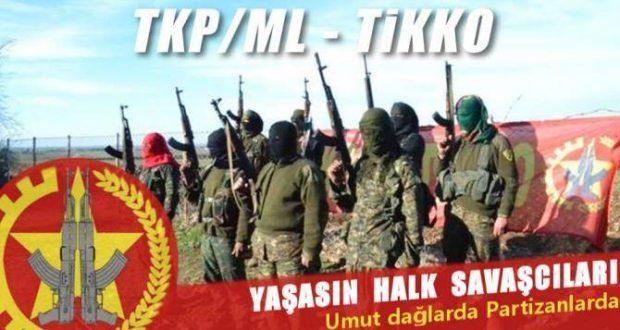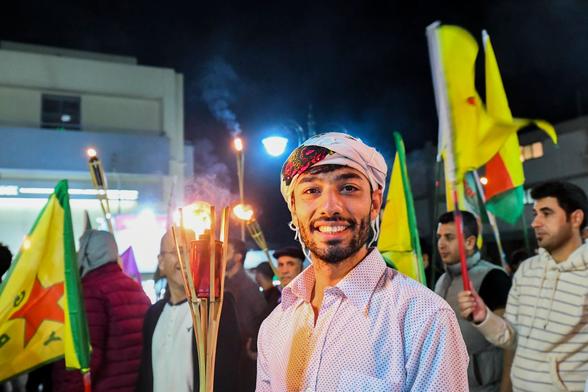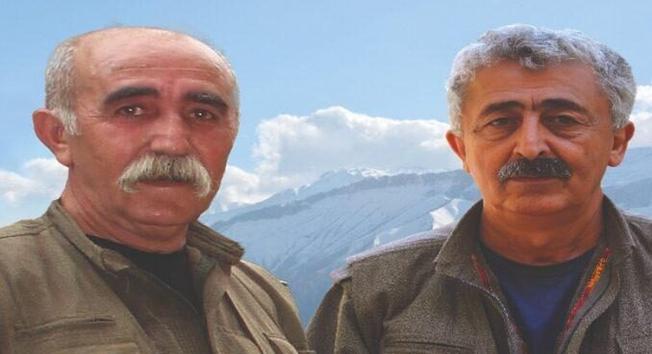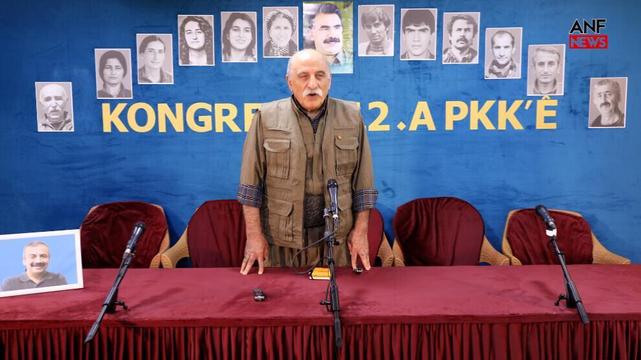PKK Formally Announces Dissolution
The Kurdistan Workers’ Party (Partiya Karkerên Kurdistan, PKK) held its 12th Extraordinary Congress between 5 and 7 May 2025, in the Medya Defense Areas, in response to Abdullah Öcalan’s ‘Call for Peace and Democratic Society’ made on 27 February 2025.
The congress was held simultaneously and in parallel in two different regions within the Medya Defense Areas. It was attended by 232 delegates, including members of the PKK Executive Committee, PKK Central Committee, co-chairs and members of the Executive Council of the Kurdistan Communities Union (KCK), members of the HPG Military Council, and coordinators from the KJK and PAJK.
Posters of Öcalan and revolutionary martyrs were displayed in the congress hall, along with a poster of Sırrı Süreyya Önder, a member of the Imrali delegation, who recently passed away. After a minute of silence in memory of the fallen revolutionaries, the selection of the congress chair began. PKK Executive Committee members Duran Kalkan and Xalîde Engîzek, KCK Executive Council member Sabri Ok, PKK Central Committee member Hêlîn Ümit, and PAJK Coordination member Raperin Munzur were chosen to form the congress chair.
Duran Kalkan: This is not an end, but a new beginning
The opening speech was made by PKK Executive Committee member Duran Kalkan, who began by commemorating all revolutionary martyrs, starting with Haki Karer, Ali Haydar Kaytan (Fuat), Rıza Altun, and Sırrı Süreyya Önder. He said that the dissolution of the PKK was “not an end, but a new beginning.” Kalkan added: “This congress is different from the others. In a way, it can be compared to our first congress. It is being held to historically conclude and properly situate the PKK. But this is not the final end; rather, the goal is to create space for new initiatives and opportunities.”
The PKK is the organization of the Apoist line
Kalkan noted that the core structure of the PKK initially formed around Leader Öcalan and later became known under names such as ‘Apocular’ (followers of Apo, as Öcalan is called), ‘Kurdistan Revolutionaries,’ and ‘Kurdistan Revolutionary Youth Union.’ Kalkan added: “By the end of 1978, the need to organize as a party was felt, leading to the name ‘Partiya Karkerên Kurdistan.’ So the PKK didn’t just suddenly emerge as such. It’s important to recognize this. But yes, the PKK became the organization of the Apoist line, taking that essence and working to give it form. Apoist militancy and PKK militancy developed on this basis.”
A congress for a new beginning
Kalkan continued: “Why is this congress like our First Congress? Back then, there was a strong will for a new beginning. Now, there is a strong will to conclude that beginning historically. But this is not an end in the sense of termination. It is about ending one phase in order to pave the way for a newer, stronger, and more ambitious beginning.”
The PKK revived a Kurdish identity on the brink of extinction
After the reading of the political report outlining Öcalan’s perspectives on the congress, the Central Committee report of the PKK was presented. The political report, which included an assessment of the political and military process, underlined the PKK’s impact over the past 50 years in Kurdistan, stating that it revived a Kurdish identity that was on the brink of extinction.
The report said: “The PKK marks a new era in Kurdish history and the birth of a new, free Kurdish identity in Kurdistan. The official formation of the party at the First Congress was a radical intervention against historical extinction and the declaration of a new era of freedom. The 12th Congress, likewise, ends the phase carried out through the PKK and aims to open the path for a new era in that history of freedom.”
The most glorious period in Kurdish history
The report underlined that dissolving the PKK’s organizational structure was not the end of the revolutionary freedom movement, but the start of a new phase: “The PKK represented the most glorious period in Kurdistan’s history. The PKK meant courage, heroism, sacrifice. It represented the free Kurdish identity based on women’s freedom. It was the rebirth of the Kurdish truth through the Apoist line. Values such as honor, loyalty, and solidarity were redefined thanks to the PKK. The Apoist Movement created all of this under the PKK name and is now placing this truth in its rightful historical position with the 12th Congress. All of this is being done entirely through our own free will and decisions, in order to advance further in the path of a free life and democratic society. The PKK will always be remembered and live on as the true movement of heroism and freedom in the history of Kurdistan.”
Decision adopted unanimously
After the evaluation of the political-military process, the congress moved to discuss the new phase of the struggle. Over the course of three days, there were intensive, multi-faceted discussions and evaluations. Proposals prepared by the Congress Preparation Committee, covering ‘Leadership, Martyrs, Veterans, the Organizational Structure of the PKK and Armed Struggle Method, and Building a Democratic Society,’ were debated and decided on. All resolutions were adopted unanimously after thorough and nuanced discussions.
The process will be managed and led by Öcalan
The most discussed and publicly anticipated resolution was the one proposing the dissolution of the PKK. Following comprehensive assessments and discussions, the congress adopted the decision “to dissolve the PKK’s organizational structure and end its armed struggle method, under the condition that the practical process is led and managed by Leader Apo, thus concluding the activities carried out under the name of the PKK.”
The 12th Extraordinary Congress of the PKK ended with the slogans ‘Bijî Serok Apo’ (Long Live Leader Apo), ‘Jin, Jiyan, Azadî’ (Woman, Life, Freedom), and ‘Insisting on Humanity is Insisting on Socialism.’
It was announced that the results from the two parallel congresses would be soon shared with the public.
The PKK (Kurdistan Workers’ Party) 12th Congress Board issued the following statement: “The process initiated by Leader Abdullah Öcalan’s statement on February 27, and further shaped by his extensive work and multidimensional perspectives, culminated in the successful convening of our 12th Party Congress between May 5–7.
Despite ongoing clashes, aerial and ground attacks, continued siege of our regions, and the KDP embargo, our congress was held securely under challenging conditions. Due to security concerns, it was conducted simultaneously in two different locations. With the participation of 232 delegates in total, the PKK 12th Congress discussed Leadership, Martyrs, Veterans, the Organizational Structure of the PKK and Armed Struggle, and Democratic Society Building, culminating in historic decisions marking the beginning of a new era for our Freedom Movement.
All activities under the PKK name have been concluded
The Extraordinary 12th Congress evaluated that the PKK’s struggle has dismantled the policies of denial and annihilation imposed on our people, bringing the Kurdish issue to a point where it can be resolved through democratic politics. It concluded that the PKK has fulfilled its historical mission. Based on this, the 12th Congress resolved to dissolve the PKK’s organizational structure and end the armed struggle, with the implementation process to be managed and led by Leader Apo [Abdullah Öcalan]. All activities conducted under the PKK name have therefore been concluded.
Our party, the PKK, emerged as a Kurdish freedom movement in opposition to the denial and annihilation policies rooted in the Treaty of Lausanne and the 1924 Constitution. Influenced by real socialism at its inception, it embraced the principle of national self-determination and carried out a legitimate, just struggle through armed resistance. The PKK was formed under conditions dominated by aggressive Kurdish denial, annihilation, genocide, and assimilation policies.
Since 1978, the PKK has conducted a freedom struggle aimed at securing recognition for Kurdish existence and establishing the Kurdish issue as a fundamental reality of Turkey. As a result of this successful struggle, our movement achieved a resurrection revolution for our people, becoming a symbol of hope and a dignified life for the peoples of the region.
During the 1990s, a period of major gains for our people, Turkish President Turgut Özal began seeking a political solution to the Kurdish issue. In response, Leader Apo declared a ceasefire on March 17, 1993, launching a new phase. However, the collapse of real socialism, the imposition of gang-like tactics on our war strategy, and the deep state’s elimination of Özal and his team sabotaged this initiative. The state intensified its denial and annihilation policies, escalating the war. Thousands of villages were evacuated and burned; millions of Kurds were displaced; tens of thousands were tortured and imprisoned; and thousands were killed under suspicious circumstances.
In response, the Freedom Movement grew both in size and capacity. Guerrilla warfare spread across Kurdistan and Turkey. The impact of the guerrilla struggle led the Kurdish people to rise in mass uprisings (serhildans), turning war into the primary option for both sides. The resulting mutual escalation of war could not be reversed, and Leader Apo’s efforts to solve the Kurdish issue through democratic and peaceful means ultimately failed.”
Rebuilding Turkish-Kurdish relations is inevitable
The process entered a different phase with the international conspiracy of February 15, 1999. In this process, one of the main goals of the conspiracy, a Kurdish-Turkish war, was prevented thanks to the great sacrifices and efforts of Leader Apo. Despite being held in the İmralı torture and genocide system, he persisted in seeking a democratic and peaceful solution to the Kurdish issue. For 27 years, Leader Apo has resisted the İmralı system of annihilation, nullifying the international conspiracy. In his struggle, he analyzed the male-dominated, power-driven statist system and developed a paradigm for a democratic, ecological, and women’s freedom-oriented society. Thus, he materialized an alternative freedom system for our people, women, and oppressed humanity.
Leader Apo, by referring to the period before the Treaty of Lausanne and the 1924 Constitution, where Kurdish-Turkish relations became problematic, proposed a framework for resolving the Kurdish issue based on the Democratic Republic of Turkey and the concept of a Democratic Nation, founded on the idea of a Common Homeland and co-founding peoples. The Kurdish uprisings throughout the history of the Republic, the 1000-year Kurdish-Turkish dialectic, and 52 years of leadership struggle have shown that the Kurdish issue can only be resolved based on a Common Homeland and Equal Citizenship.
We announce the martyrdom of Ali Haydar Kaytan and Riza Altun
Our 12th PKK Congress, convened at the call of our leadership, has declared the martyrdom of Fuat-Ali Haydar Kaytan, one of our party’s leading cadres, who was martyred on July 3, 2018, and comrade Riza Altun, martyred on September 25, 2019. On this basis, it has recognized comrade Fuat-Ali Haydar Kaytan, one of the founding leading cadres of the PKK, as the symbol of “Loyalty to the Leader, Truth, and Sacred Life,” and comrade Riza Altun, one of Leader Apo’s first comrades, as the symbol of “Freedom Comradeship.” We dedicate our historic 12th Party Congress to these two great martyr comrades who have led us from the beginning of our Freedom Movement until today with their uninterrupted struggle. In their names, we renew our promise to all martyrs of the struggle and affirm our commitment to fulfilling the dreams of Peace and Democracy Martyr Comrade Sırrı Süreyya Önder.
https://abolitionmedia.noblogs.org/?p=19086
#guerrilla #iraq #kurdistan #pkk #turkey #westAsia



